
Bubble tea is a tea-based drink that originated in Taiwan in the early 1980s. It most commonly consists of tea accompanied by chewy tapioca balls, but it can be made with other toppings as well. There is a common misconception that the name "bubble tea" refers to the appearance of the pearls, but it originates from the appearance of bubbles in the milk and tea blend after it is removed from the shaking machine.

The Democratic Progressive Party (DPP) is a Taiwanese nationalist and centre-left political party in Taiwan. Controlling both the Republic of China presidency and the unicameral Legislative Yuan, it is the majority ruling party and the dominant party in the Pan-Green Coalition as of 2020.

Taiwan, officially the Republic of China (ROC), is a country in East Asia. Neighbouring countries include the People's Republic of China (PRC) to the northwest, Japan to the northeast, and the Philippines to the south. The main island of Taiwan has an area of 35,808 square kilometres (13,826 sq mi), with mountain ranges dominating the eastern two-thirds and plains in the western third, where its highly urbanised population is concentrated. The capital is Taipei, which, along with New Taipei and Keelung, forms the largest metropolitan area of Taiwan. Other major cities include Kaohsiung, Taichung, Tainan and Taoyuan. With 23.57 million inhabitants, Taiwan is among the most densely populated countries.
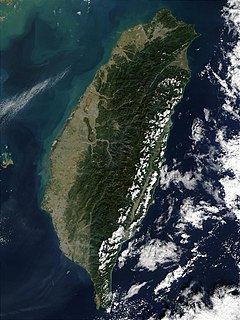
Taiwan, officially the Republic of China (ROC), is an island country in East Asia. The main island of Taiwan, known historically in English as Formosa, makes up 99% of the area controlled by the ROC, measuring 35,808 square kilometres (13,826 sq mi) and lying some 180 kilometres (112 mi) across the Taiwan Strait from the southeastern coast of mainland China. The East China Sea lies to the north of the island, the Philippine Sea to its east, the Luzon Strait directly to its south and the South China Sea to its southwest. The ROC also controls a number of smaller islands: some in the Taiwan Strait, and some of the South China Sea Islands.
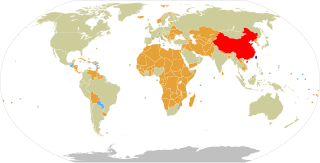
The Republic of China (ROC), commonly known as Taiwan, has full diplomatic relations with 14 out of 193 United Nations member states, as well as the Holy See. Historically, the ROC has required its diplomatic allies to recognise it as the sole legitimate government of China, but since the 1990s, its policy has changed into actively seeking dual recognition with the PRC. In addition to these relations, the ROC also maintains unofficial relations with 57 UN member states via its representative offices and consulates.
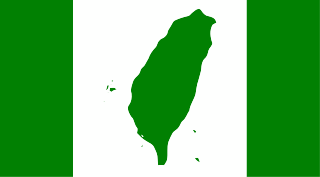
The Taiwan independence movement is a political movement to seek formal international recognition of Taiwan as an independent, sovereign state and in opposition to Chinese unification.

Taiwanese indigenous peoples, also known as the Formosan people, Taiwanese Austronesians, Yuanzhumin or Gāoshān people, are the indigenous peoples of Taiwan, who number almost 569,008 or 2.38% of the island's population. This total is increased to more than 800,000 people if the indigenous peoples of the plains in Taiwan are included, pending future official recognition. Recent research suggests their ancestors may have been living on Taiwan for approximately 5,500 years in relative isolation before major Han (Chinese) immigration from mainland China began in the 17th century.

Mainland China, also known as the Chinese mainland, China mainland, or the Mainland Area of the Republic of China is the geopolitical area under the direct jurisdiction of the People's Republic of China (PRC) since October 1, 1949. It includes Hainan, which is an island province in the South China Sea, but it excludes the special administrative regions of Hong Kong and Macau, even though both are mostly on the geographic continental landmass.

Taipei, officially Taipei City, is the capital and a special municipality of Taiwan. Located in Northern Taiwan, Taipei City is an enclave of the municipality of New Taipei City that sits about 25 km (16 mi) southwest of the northern port city of Keelung. Most of the city rests on the Taipei Basin, an ancient lakebed. The basin is bounded by the relatively narrow valleys of the Keelung and Xindian rivers, which join to form the Tamsui River along the city's western border.
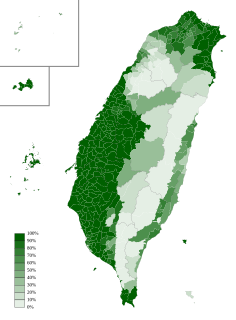
Taiwanese, also known as Taigi,, Taiwanese Minnan, Holo, Taiwanese Hokkien, is a variety of the Hokkien language spoken natively by about 70% of the population of Taiwan. It is spoken by the Taiwanese Hoklo people, who descended from immigrants from southern Fujian during the Qing dynasty. The Pe̍h-ōe-jī (POJ) romanization is a popular orthography for Taiwanese.
The controversy regarding the political status of Taiwan, sometimes referred to as the Taiwan Issue or Taiwan Strait Issue, or from a Taiwanese perspective as the mainland Issue, is a result of the Chinese Civil War and the subsequent split of China into the two present-day self-governing entities of the People's Republic of China and the Republic of China.
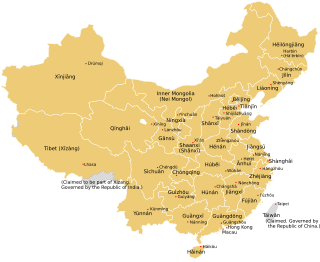
Provincial-level administrative divisions or first-level administrative divisions, are the highest-level Chinese administrative divisions. There are 34 such divisions claimed by the People's Republic of China, classified as 23 provinces, four municipalities, five autonomous regions, and two Special Administrative Regions; The political status of Taiwan Province along with a small fraction of Fujian Province remain in dispute, those are under separate rule by the Republic of China.
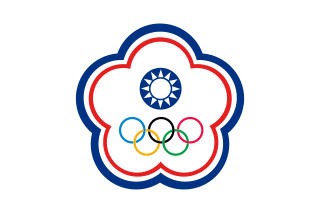
"Chinese Taipei" is the name used in some international organizations and competitions for Taiwan. This name was first proposed in the Nagoya Resolution whereby the ROC/Taiwan and the People's Republic of China (PRC) recognize the right of participation to each other when it comes to the activities of the International Olympic Committee and its correlates. The ROC participates under this name in various international organizations and events, including the World Trade Organization, the World Health Organization, the Metre Convention, and international pageants.

Chinese people are people or ethnic groups identified with China, usually through ethnicity, nationality, citizenship, or other affiliation.

The Republic of China Navy, also known as the Taiwan Navy is the maritime branch of the Republic of China Armed Forces. The ROC Navy's primary mission is to defend ROC territories and the sea lanes that surround Taiwan against a blockade, attack, or possible invasion by the People's Liberation Army Navy of the People's Republic of China. Operations include maritime patrols in the Taiwan Strait and surrounding waters, as well as counter-strike and counter-invasion operations during wartime. The Republic of China Marine Corps functions as a branch of the Navy.

Cross-Strait relations refer to the relationship between the following two political entities, which are separated by the Taiwan Strait in the west Pacific Ocean:

Tsai Ing-wen is a Taiwanese politician and academic. Tsai was elected as the seventh president of Taiwan, in 2016. And is A member of the Democratic Progressive Party, Tsai is the first female president of Taiwan. She has served as Chair of the Democratic Progressive Party (DPP) since 2020, and previously from 2008 to 2012 and 2014 to 2018.
Taiwanese people may be generally considered the people of Taiwan who share a common culture, ancestry, and speak Taiwanese Mandarin, Hokkien, Hakka, or indigenous Taiwanese languages as a mother tongue.

Japanese Taiwan was the period of Taiwan and the Penghu Islands under Japanese rule between 1895 and 1945.

The COVID-19 pandemic in Taiwan is part of the worldwide pandemic of coronavirus disease 2019 caused by severe acute respiratory syndrome coronavirus 2. The pandemic has had a smaller impact in Taiwan than in most other industrialized countries, with a total of eleven deaths as of 11 April 2021, a rate of 0.042 deaths per 100,000 people. The number of active cases peaked on 6 April 2020 at 307 cases, the overwhelming majority of which were imported.


















